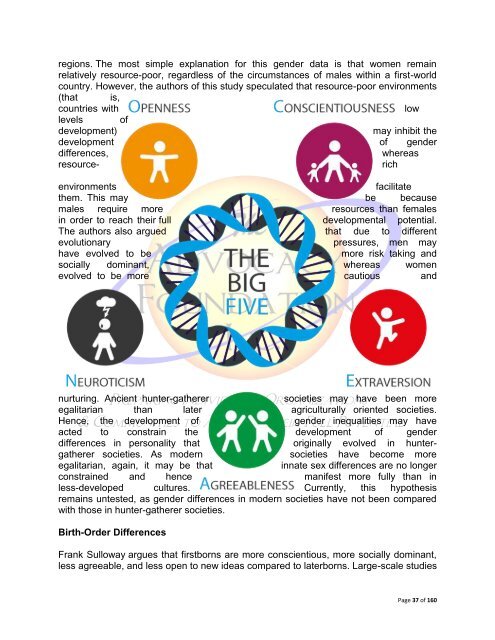The Gift of Introversion
The Gift of Introversion
The Gift of Introversion
Create successful ePaper yourself
Turn your PDF publications into a flip-book with our unique Google optimized e-Paper software.
egions. <strong>The</strong> most simple explanation for this gender data is that women remain<br />
relatively resource-poor, regardless <strong>of</strong> the circumstances <strong>of</strong> males within a first-world<br />
country. However, the authors <strong>of</strong> this study speculated that resource-poor environments<br />
(that is,<br />
countries with<br />
low<br />
levels <strong>of</strong><br />
development)<br />
may inhibit the<br />
development <strong>of</strong> gender<br />
differences,<br />
whereas<br />
resource-<br />
rich<br />
environments<br />
facilitate<br />
them. This may be because<br />
males require more resources than females<br />
in order to reach their full developmental potential.<br />
<strong>The</strong> authors also argued that due to different<br />
evolutionary pressures, men may<br />
have evolved to be<br />
more risk taking and<br />
socially dominant, whereas women<br />
evolved to be more cautious and<br />
nurturing. Ancient hunter-gatherer<br />
societies may have been more<br />
egalitarian than later agriculturally oriented societies.<br />
Hence, the development <strong>of</strong> gender inequalities may have<br />
acted to constrain the development <strong>of</strong> gender<br />
differences in personality that originally evolved in huntergatherer<br />
societies. As modern societies have become more<br />
egalitarian, again, it may be that<br />
innate sex differences are no longer<br />
constrained and hence manifest more fully than in<br />
less-developed cultures. Currently, this hypothesis<br />
remains untested, as gender differences in modern societies have not been compared<br />
with those in hunter-gatherer societies.<br />
Birth-Order Differences<br />
Frank Sulloway argues that firstborns are more conscientious, more socially dominant,<br />
less agreeable, and less open to new ideas compared to laterborns. Large-scale studies<br />
Page 37 <strong>of</strong> 160

















